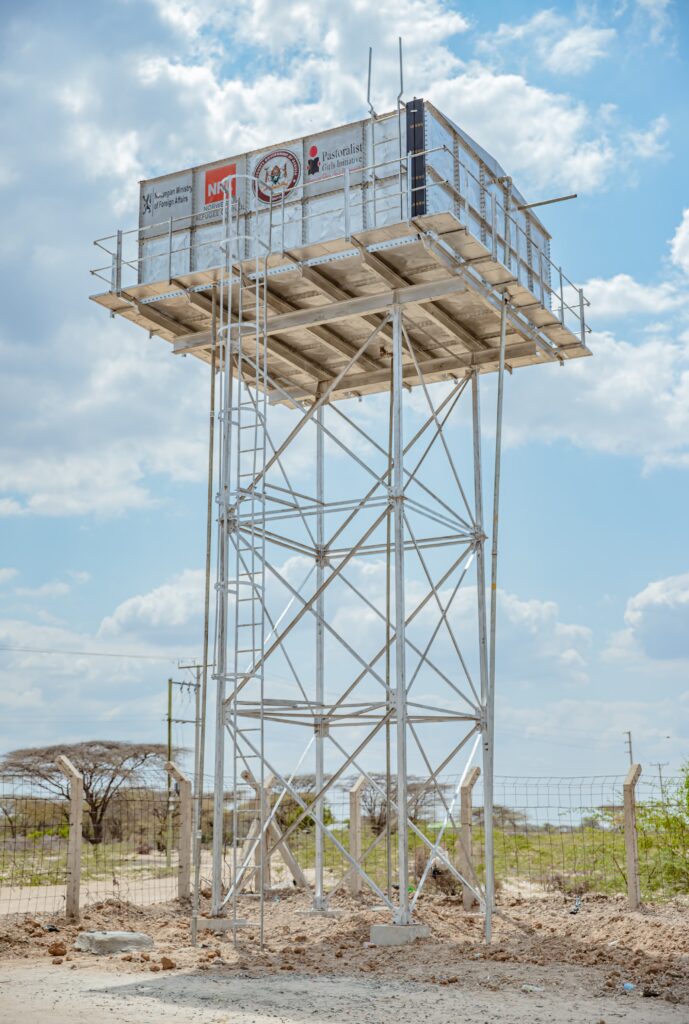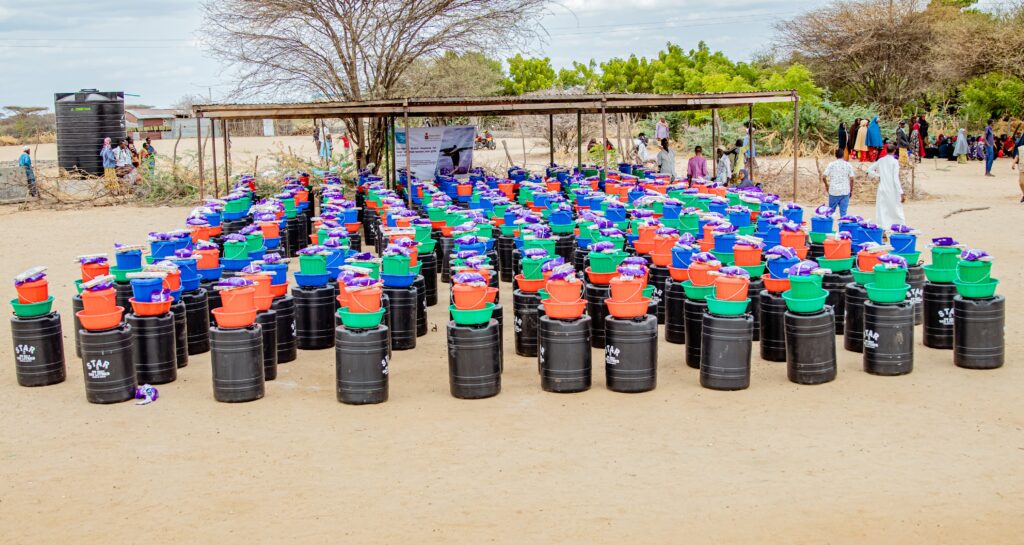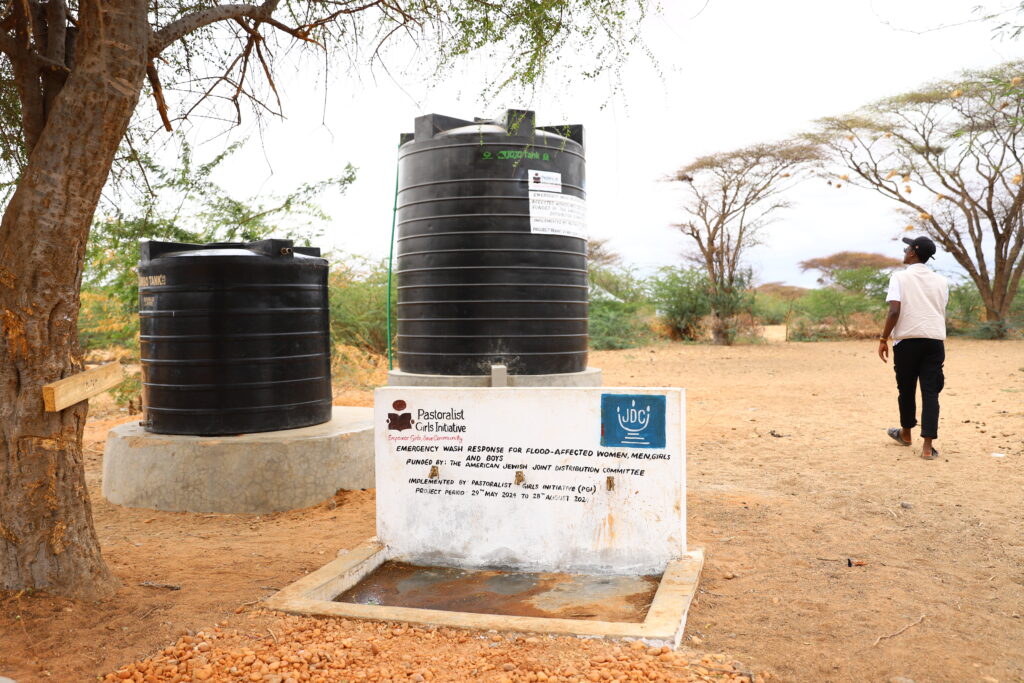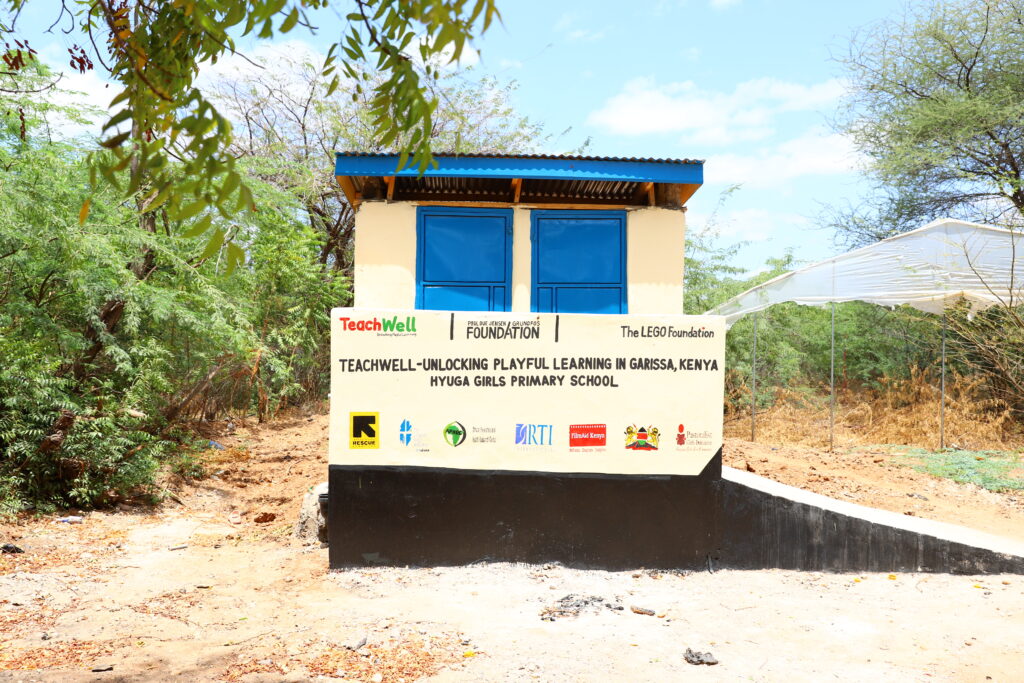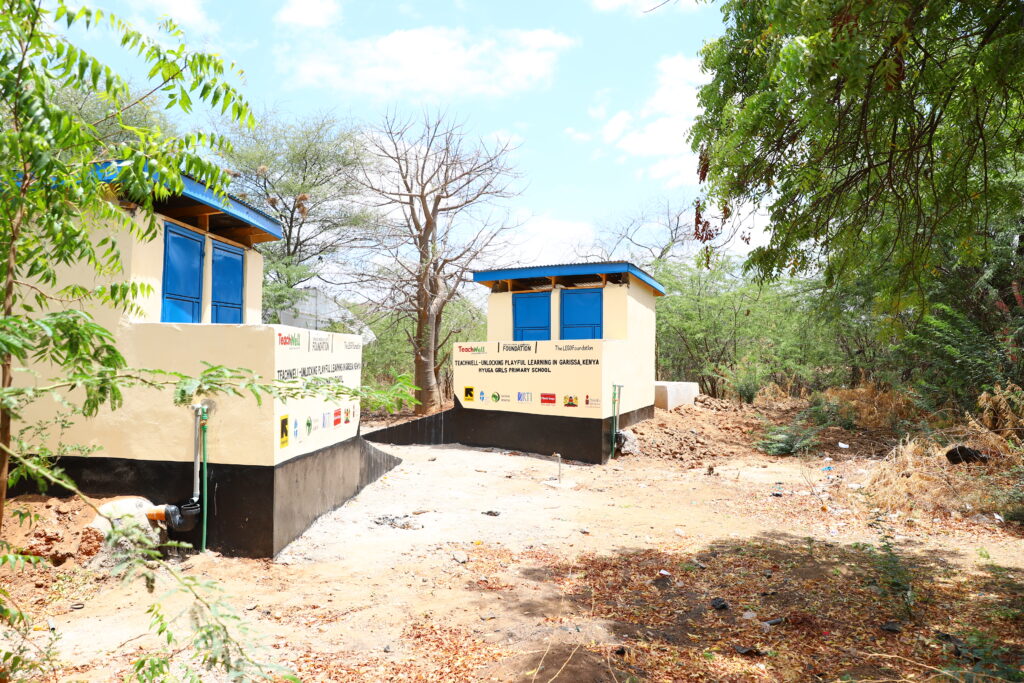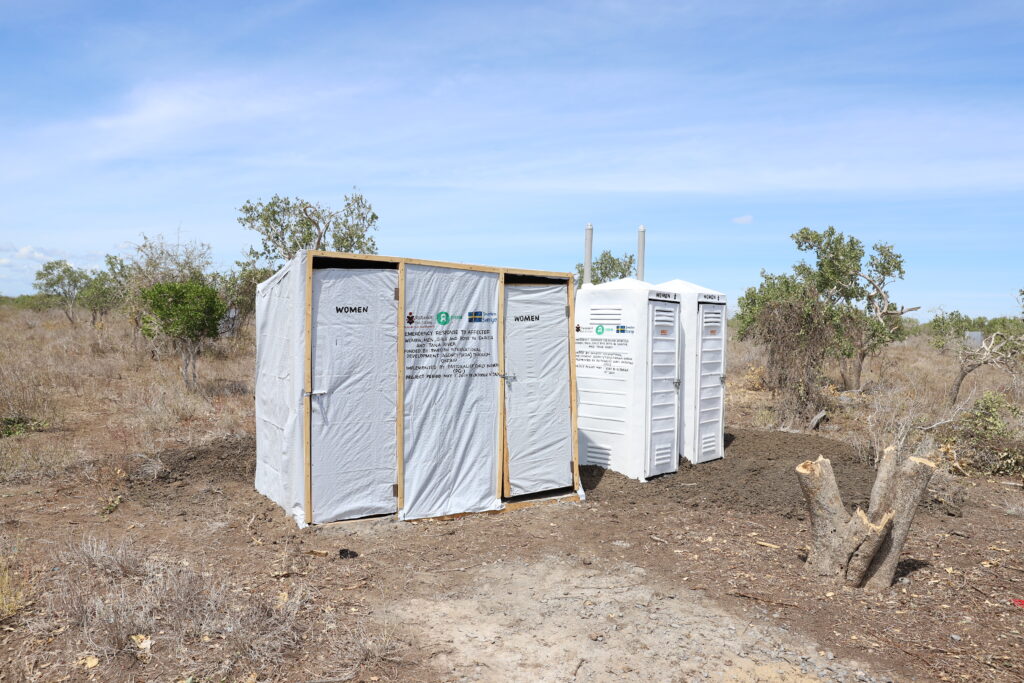8,669 households gained access to clean water, improved hygiene practices, and adequate sanitation.
PGI’s vision is: ‘Empowered ASAL communities realizing their fullest potential and leading dignified human lives’. Its mission is: ‘To promote sustainable development by enhancing the capacities of ASAL communities through integrated development approaches’. By integrating natural resource management with climate-resilient WASH initiatives (improving water access, improving hygiene requisites, provision of proper sanitation facilities and practices), PGI has been assisting ASAL communities in Garissa and Tana River counties strengthen their resilience to environmental challenges such as recurrent floods and drought events.
Key Achievements
Humanitarian Assistance
The WASH projects implemented in Garissa and Tana River counties have significantly contributed to addressing challenges posed by drought and floods. These interventions span water access, hygiene promotion, and sanitation facilities, reaching thousands of beneficiaries.
- Water Access
Across the projects, a total of 11 boreholes were rehabilitated to improve water availability, particularly in drought-affected areas. Additionally, 19 water storage tanks were installed, including 3 steel tanks and 16 PVC tanks ranging from 5,000 to 10,000 liters. To extend water access, 12.3 kilometers of HDPE pipeline were constructed, and 1 water kiosk was established.
- Hygiene Promotion
The projects distributed over 3,060 non-food item (NFI) kits, including essential hygiene materials. To encourage proper hygiene practices, 109 CHP training sessions were conducted, complemented by 45 community WaSH education sessions and 27 dialogue engagements. The interventions also aired 24 radio spots to raise awareness about water, sanitation, and hygiene practices. Furthermore, 39 handwashing facilities were installed in flood-affected areas to promote disease prevention.
Waste management was a key focus, with comprehensive kits provided. These kits included a total of 28 rakes, 28 wheelbarrows, 28 shovels, 325 waste bags, and 120 pairs of gloves for clean-up activities in affected areas.
- Sanitation Facilities
The projects provided 95 latrines (8 permanent VIP latrines, 5 semi-permanent pit latrines, and 62 emergency mobile latrines) across various locations. These facilities addressed immediate needs in emergency settings and contributed to long-term sanitation infrastructure in schools and communities.
Collectively, these interventions reached a total of 8,669 households, ensuring access to clean water, improved hygiene practices, and adequate sanitation. Additionally, 1,226 pupils in three primary schools benefited from targeted WaSH education sessions and improved infrastructure. The combined efforts of these projects have enhanced the resilience of vulnerable communities in Garissa and Tana River counties. By rehabilitating water sources, promoting hygiene, and providing essential sanitation facilities, the interventions have mitigated the impacts of drought and floods while fostering sustainable development in the region.
Under the Survivor Community Led Response (SCLR) approach, grants provided to community groups have facilitated the construction of critical WaSH infrastructure, empowering communities to address their own water, sanitation, and hygiene needs sustainably. Through these initiatives, a total of 10 sanitation facilities have been and 6 water tanks have been installed to ensure reliable water supply for domestic and communal use. These construction efforts were paired with hygiene promotion initiatives focused on proper facility maintenance and usage. By combining infrastructure development with behavior change efforts, communities were equipped to sustain these improvements over the long term.
To enhance sustainability and efficiency in WaSH services, 13 Water Users’ Committees received training on leadership, focusing on legal frameworks and water governance, as well as management skills in financial and water resource management. The programs also supported 6 WaSH forums and 4 stakeholder management meetings, fostering collaboration among community representatives, government, NGOs, and private sector actors. These initiatives strengthened coordination, shared best practices, and empowered communities to manage water and sanitation resources effectively
Goals of the Year
- Milestones in influencing policies to support pastoralist livelihoods.
- Partnerships with government, NGOs, and private sector actors.
Collaboration across sectors has been central to achieving WASH milestones, with partnerships driving shared goals and resource efficiency. Government agencies played a key role in facilitating policy dialogues and providing regulatory support for WaSH interventions. Their involvement in forums and stakeholder meetings ensured alignment with national and county development priorities, particularly in drought and flood response efforts. In addition, partnering with organizations such as Oxfam, JDC, NRC, and IRC enabled resource sharing and coordinated responses to emergencies. These collaborations highlighted opportunities for long-term investment in water and sanitation solutions.
- Gender equality and inclusion efforts.
- Environmental sustainability initiatives in pastoralist communities.
- Safeguarding and protection efforts.
The WASH projects promoted gender equality by involving women and marginalized groups in Water Users’ Committees, ensuring their participation in decision-making. Special attention was given to female-headed households and vulnerable individuals, providing equal access to NFI kits, water points, and sanitation facilities. WaSH education also addressed menstrual hygiene management and other gender-sensitive issues.
Environmental sustainability was a focus, with efforts to rehabilitate boreholes and install water storage tanks and rainwater harvesting systems. Waste management kits were distributed to encourage responsible waste disposal, and climate-resilient infrastructure like VIP latrines was built to withstand environmental challenges.
The projects integrated safeguarding measures to protect vulnerable populations, especially in the distribution of resources. Child protection was emphasized in WaSH education for schoolchildren, and safe spaces for women and children were prioritized in the design of sanitation facilities and siting of communal water collection points.
We collected only essential data required for the projects. This helped reduce privacy risks by limiting the amount of personal information gathered and stored. We adhered to data protection guidelines, including limiting access to beneficiary data to only those directly involved in the projects
- Key barriers faced during project implementation (e.g., logistical, cultural, or environmental issues).
- Innovative solutions or adaptations.
- Lessons learned to inform future strategies.
Challenges
Several challenges impacted the WaSH interventions, hindering timely and effective implementation. Infrastructure damage, particularly the destruction of the Nairobi-Garissa Highway during the flooding seasons, delayed access to affected communities, resulting in shortages of basic commodities and price hikes. The IDP camps in Bakuyu, Ziwani, and Young Muslims faced a critical shortage of sufficient space for the construction of latrines to meet the required Sphere standards, exacerbated by congestion and worsening sanitation challenges. While the e-voucher system proved effective in distributing resources, limited accessibility in remote areas affected the timeliness of the interventions. WASH interventions, which require significant time for behavior change and construction, faced challenges in achieving measurable impact within the projects’ limited timeframe.
Lessons Learned
Several lessons emerged from these challenges, offering valuable insights for future projects. First, finding safe water sources is far more effective than relying solely on water treatment, and providing proper storage containers is essential to prevent contamination. In flood situations, speed of response is critical, particularly when it comes to safe excreta disposal. Hygiene promotion should be integrated into all phases of the response, with community engagement being a key factor in ensuring lasting behavior changes.
Community engagement played a vital role, particularly in early warning systems, which helped save lives and property by disseminating critical information at the grassroots level. Effective stakeholder collaboration was crucial, as working with local governments, NGOs, and the private sector significantly enhanced the reach and impact of interventions.
In infrastructure design, considering environmental risks such as elevating latrines above ground to prevent flooding was essential for long-term sustainability. Continuous and routine monitoring and evaluation allowed for adjustments to be made quickly, improving overall project effectiveness. Finally, capacity building for local communities in managing and maintaining water infrastructure proved essential for ensuring the long-term success and ownership of the projects.
- Goals and objectives for the coming year.
- Strategic focus areas for humanitarian and livelihood efforts.
- Innovations and scaling opportunities.
Garissa and Tana River Counties continue to face significant challenges due to the escalating effects of climate change, including recurrent flooding and prolonged droughts. These extreme weather events have compounded existing vulnerabilities, particularly in access to WaSH services as well as food security and livelihoods. Addressing these challenges requires innovative and adaptive approaches to build resilience and ensure sustainable development.
In the coming year, PGI aims to strengthen community resilience and adaptation to climate change by prioritizing investments in climate-adaptive WASH infrastructure and resilience-building programs. This will include the development of WASH systems designed to withstand the impacts of flooding and drought, ensuring communities have consistent access to clean water and sanitation services. Recognizing the importance of local ownership, PGI will also support community-led initiatives that enhance disaster preparedness and establish early warning systems to mitigate the effects of climate shocks.
A key focus will be on promoting equitable resource management through sustainable governance of natural resources, fostering peaceful coexistence among communities. Investments will also be directed toward creating water harvesting, storage, and distribution systems that are tailored to the unique climate challenges of the region. Complementary efforts will focus on integrating renewable energy solutions to power critical infrastructure in remote areas, ensuring sustainable and reliable access to essential services while reducing dependence on traditional energy sources.
PGI is committed to leveraging innovative technologies to scale up climate-smart agricultural practices, such as drought-resistant crops and efficient irrigation systems.
Fun Facts About our ACHIEVMENTS
non-food item (NFI) kitsTo encourage proper hygiene practices
Latrines across various locations
boreholes rehabilitated to improve water availability
Pupils in three primary schools
